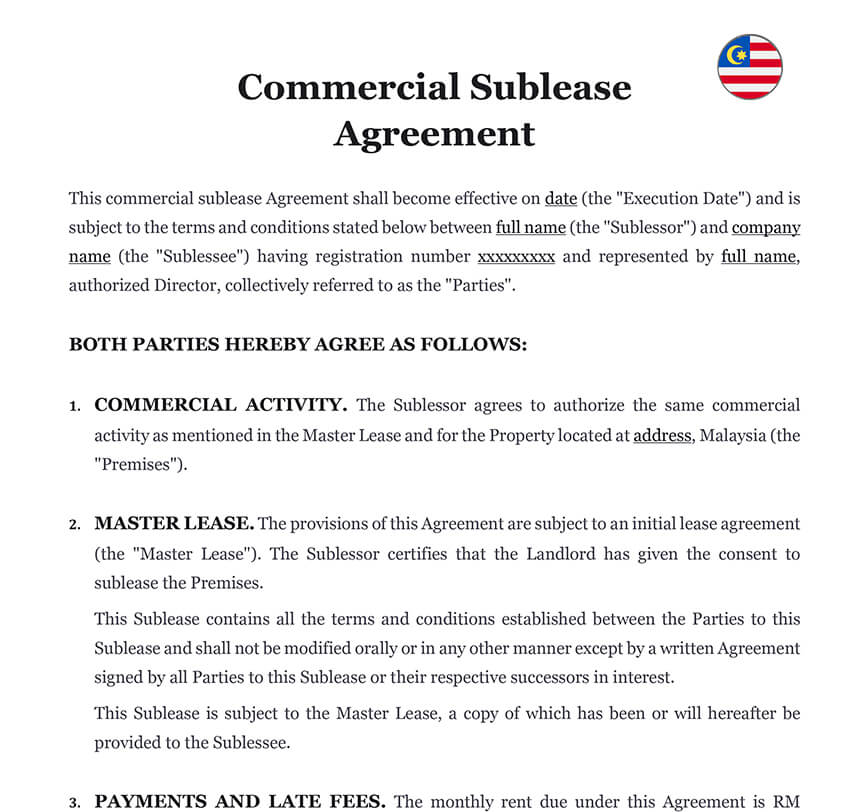Ready to use legal template
Drafted by experienced lawyers
Chinese-English translation
Ready to use legal template
Drafted by lawyers
Chinese-English translation
Home › Rent your property › Commercial sublease agreement
Learn more about Commercial Sublease Agreement in China
A Commercial Sublease Agreement is a legal contract where a tenant (the “Sublandlord”) rents out all or part of their leased commercial property to another party (the “Subtenant”). This agreement serves to formalize the terms under which the Subtenant will occupy the space, including rent, duration, and usage, while ensuring compliance with the terms of the original lease. A well-drafted Commercial Sublease Agreement provides clear protection for both parties and helps avoid potential legal disputes. Download our easy-to-edit Commercial Sublease Agreement template, available in both English and Mandarin. Crafted by expert lawyers, this template ensures your business stays compliant while maintaining the flexibility you need.
Table of contents
-
What is a Commercial Sublease Agreement?
-
What is included in this Commercial Sublease Agreement?
-
Do I need the landlord’s consent to sublease a property in China?
-
Can any type of business property be rented?
-
How long can a Commercial Sublease Agreement last in China?
-
Can the Commercial Sublease Agreement be transferred to another party?
-
What are the responsibilities of the subtenant in a Commercial Sublease?
-
Is the Commercial Sublease Agreement subject to the original lease conditions?
-
Can a Commercial Sublease Agreement be terminated early in China?
What is a Commercial Sublease Agreement?
A Commercial Sublease Agreement is a contract that allows a tenant (Sublandlord) to lease their rented commercial property, or a part of it, to another party (Subtenant). This agreement establishes the terms and conditions under which the Subtenant can use the property. These conditions include the rent amount, the length of the lease term, payment schedules, and other responsibilities related to property maintenance and use. A business sublet is an arrangement between an existing tenant, a new tenant seeking space, and the property owner. Even if a renter sublets a commercial property, the original tenant is still obligated to fulfill the Commercial Lease Agreement’s obligations. In China, subleasing is common in both residential and commercial settings, particularly for businesses needing flexible space. If you’re subleasing a residential space, ensure a clear and legally sound agreement with our Sublease Agreement.
The Sublandlord is still responsible for the terms of the Master Lease with the property owner, and the Subtenant must follow the subleasing rules defined in the Sublease Agreement. This document ensures both parties are clear on their rights and obligations, reducing potential disputes
What is included in this Commercial Sublease Agreement?
The Commercial Sublease Agreement includes the following key clauses:
| ➤ Commercial activity: The sublessor authorizes the sublessee to conduct business activities as permitted under the master lease for the property located in China (the “premises”). |
| ➤ Master lease: The sublease agreement is subject to the master lease, and the sublessor certifies that the landlord has given written consent for subleasing as required by China’s contract law and real estate management regulations. |
| ➤ Payments and late fees: The sublessee must pay rent in renminbi (rmb) on a monthly basis, with late payments incurring a penalty of 0.05% per day on the outstanding amount. |
| ➤ Security deposit: The sublessee must pay a security deposit equivalent to two months’ rent before the execution date. The deposit is refundable within thirty (30) business days after the lease expires, provided all obligations are met. |
| ➤ Use of premises: The sublessee may use the premises strictly for commercial purposes as specified in the master lease and in compliance with Chinese zoning and business licensing laws. |
| ➤ Utilities and services: The sublessee is responsible for all utility costs, including water, electricity, gas, internet, and other necessary services, unless otherwise agreed in writing. |
| ➤ Repair and maintenance: The sublessee must maintain the premises in good condition and is liable for any damage beyond normal wear and tear, in accordance with China’s property law. |
| ➤ Taxes: The sublessee must pay all applicable taxes, including business tax, property tax, and any other government-imposed fees arising from the use of the premises. |
| ➤ Dispute resolution: In case of disputes, both parties agree to negotiate in good faith before taking legal action, with mediation or arbitration in accordance with Chinese contract law. |
| ➤ Governing law and jurisdiction: This agreement is governed by the laws of the People’s Republic of China, and any disputes shall be resolved in the competent courts of the city where the property is located. |
This table summarizes the core clauses that make up the Commercial Sublease Agreement, ensuring all important aspects of the leasing arrangement are addressed.
Do I need the landlord’s consent to sublease a property in China?
Yes, obtaining the landlord’s consent is a crucial part of subleasing a property in China. Subleasing without the landlord’s approval could lead to a breach of the original lease agreement, potentially resulting in eviction or legal action. As per the Contract Law of China, the tenant must ensure that subleasing complies with the terms of the Master Lease, and the landlord must provide written consent.
Chinese Real Estate Management Regulations stipulate that subletting should only occur if the landlord has authorized it explicitly in writing. This helps avoid misunderstandings and ensures that both parties, landlord and Sublandlord are in compliance with Chinese legal standards. For further information on China’s Real Estate Management Regulations, refer to the official Chinese Real Estate Management Regulations.
- Remarks:
Obtaining written consent from the landlord is crucial before subleasing a property. Without this approval, you risk breaching the main lease, which could lead to legal penalties, including contract termination. Ensure this step is followed to avoid disputes.
Can any type of business property be rented?
In China, subleasing commercial properties is common, but the type of property you can sublet depends on several factors. The original lease must allow subleasing of the specific type of commercial property in question. For example, if the space is zoned for residential use, it cannot legally be subleased for business purposes.
Furthermore, the Sublandlord must ensure the Premises are appropriately licensed for commercial activities, in line with local zoning and business licensing regulations. The Subtenant must also comply with all local laws regarding the permitted use of the property.
For more information on zoning laws and business licensing, check official resources from the State Administration for Market Regulation.
How long can a Commercial Sublease Agreement last in China?
The duration of a Commercial Sublease Agreement in China is typically determined by the term specified in the original Master Lease. The sublease cannot extend beyond the Master Lease term unless the landlord explicitly allows it. The Sublease Agreement should clearly outline the start and end dates of the sublease, and the Subtenant must vacate the property at the end of the term unless both parties agree to an extension. The length of the sublease is negotiable between the Sublandlord and Subtenant but must comply with the terms of the original lease.
Can the Commercial Sublease Agreement be transferred to another party?
Transferring a Commercial Sublease Agreement to another party is generally subject to the same rules as the original sublease. The Sublandlord may allow the Subtenant to transfer their rights to a third party, but this transfer would typically require written consent from both the Sublandlord and the landlord.
In some cases, the Master Lease may explicitly prohibit transferability of the sublease. Therefore, it is important to review the original lease agreement before allowing a transfer. Any transfer should be formally documented to avoid potential legal issues.
What are the responsibilities of the subtenant in a Commercial Sublease?
The Subtenant has several key responsibilities, including:
| ➤ Paying Rent: The subtenant must pay rent as agreed upon in the sublease, according to the payment schedule. |
| ➤ Maintaining the Premises: The subtenant is responsible for the upkeep of the property and must report any damages or issues that need repair. |
| ➤ Complying with Laws: The subtenant must comply with all applicable Chinese laws, including business regulations, zoning laws, and health and safety codes. |
| ➤ Utility Payments: The subtenant is typically responsible for paying utility bills such as electricity, water, and gas. |
Is the Commercial Sublease Agreement subject to the original lease conditions?
Yes, a Commercial Sublease Agreement is subject to the terms of the Master Lease. The Sublandlord must ensure that the sublease does not violate any clauses of the original lease, especially concerning the permitted use of the property, rent payment terms, and the duration of the lease.
If the Sublandlord does not comply with the terms of the Master Lease, it could lead to legal issues or even eviction from the property. It is essential to have the landlord’s approval and ensure that the sublease complies with the original lease conditions.
ℹ️ Protect your business interests with a well-drafted Commercial Lease Agreement for your property
Can a Commercial Sublease Agreement be terminated early in China?
Yes, a Commercial Sublease Agreement can be terminated early under certain conditions. The terms of the agreement should specify whether early termination is allowed, and if so, the procedures that need to be followed. Common conditions for early termination include:
| ➤ Breach of Contract: If either party violates the terms of the sublease, the other party may have grounds for early termination. |
| ➤ Mutual Agreement: Both parties may agree to terminate the sublease early, though the subtenant may still be responsible for some costs such as unpaid rent or damages. |
| ➤ Force Majeure: In cases where events outside of the control of both parties occur (e.g., natural disasters), the agreement may be terminated early. |
ℹ️ Legally notify tenants of sublease violations or termination with a clear and enforceable Eviction Notice Letter.
Conclusion: Why does Commercial Subleases matter in China?
A Commercial Sublease Agreement is an essential document for businesses in China looking to sublet commercial property. By ensuring compliance with the original lease and Chinese regulations, both Sublandlords and Subtenants can protect their interests. Whether you need to outline rent payments, security deposits, or other responsibilities, a well-crafted agreement ensures transparency and minimizes risks. Download our customizable template, available in English and Mandarin, to help formalize your sublease arrangement and stay compliant with Chinese law.
Commercial SubleaseAgreement Template (.docx)
Save on attorney fees
310 client reviews (4.8/5) ⭐⭐⭐⭐⭐
Share information
Why Themis Partner ?
Make documents forhundreds of purposes
Hundreds of documents
Instant access to our entire library of documents for China.
24/7 legal support
Free legal advice from our network of qualified lawyers.
Easily customized
Editable Word documents, unlimited revisions and copies.
Legal and Reliable
Documents written by lawyers that you can use with confidence.




